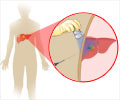Tumor Markers in Testicular Cancer
In testicular cancers, two main classes of tumor markers have been identified. They are -
Onco-fetal substances, examples of which are Alpha Feto Protein (AFP) and Human Chorio Gonadotropin (HCG). These help in the diagnosis and prognosis of testicular cancers.
Alpha-Fetoprotein (AFP) is a tumor marker that helps in diagnosing germ cell (non-seminoma) carcinoma. AFP is also a useful tool for monitoring recurrence and treatment response.
An increased AFP reading has been described by Sell as "the single most discriminating laboratory test indicative of malignant disease now available."
The normal level of AFP is less than 16 ng / ml. A Raised AFP concentration could indicate the following:
- Pure Embryonal carcinoma
- Teratocarcinoma
- Yolk sac Tumor
- Combined Tumor
It is important to note that if AFP is not raised, it does not indicate a benign state. It could mean Pure Choriocarcinoma or Pure Seminoma.
AFP level is also elevated in patients with hepatocellular carcinoma, patients who are positive for Hepatitis B virus, liver diseases such as cirrhosis and also in pregnant women. It is also increased in conditions such as ataxia-telangiectasia and Hereditary Tyrosinosis.
Human Chorio Gonadotropin (HCG) levels are used as tumor markers to diagnose testicular cancer. HCG is made up of alpha and beta polypeptide chains. The normal value of this hormone is less than 1 ng.
Raised β HCG levels are rarely elevated in seminoma but always elevated in Chorio carcinoma of testis. The figures below provide the chances of having an elevated β HCG level in different types of testicular cancers -
| 100% | Chorio carcinoma |
| 60% | Embryonal carcinoma |
| 55% | Teratocarcinoma |
| 25% | Yolk Cell Tumor |
| 7% | Seminomas |












